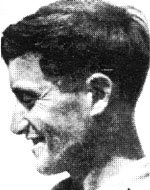Strostinski, Yitzhak
Son of Ada and Moshe. He was born on April 18, 1913, in Kishinev, Russia. As a child, he and his mother were taken to Kremenchug on the banks of the Dnieper to be close to his father, whose unit was parked nearby. In 1917, the family returned to Kishinev, where Yitzhak remained until his arrival in Israel. He was a devoted son to his parents. He used to help with housework. During his vacation he cleaned the house and made it easier for his mother to work. In his attitude to his friends, he also excelled in his willingness to help others, to help the weak and to support the weak. After studying in the “cheder,” he moved to the Magen David School, when he was eight years old. He was an outstanding student from his first day in school until the end of his studies. Because he was fast-paced, he did not need to memorize the lessons and did well in his studies. The information he acquired at the school was completed and expanded so that he could be of help to his classmates. He saw a duty to fulfill what the teachers had missed. It was exciting to see Yitzhak’s class (as his classmates called it) preparing for the exams. Yitzhak, the thirteen-year-old boy, divided the students into groups according to their level of knowledge in the different subjects, so that they complemented each other, while he memorized the material with the weak in the class. He coined the slogan in his class, “We cannot fail the exams” . Yitzhak was one of the founders of Kibbutz Aliyah, “Ba’alma” in the Diaspora in 1932 and immigrated to Israel in the first organized company in 1934. His hopes were not disappointed and he headed the founders of the new kibbutz. When the Palmach was established, Yitzhak was drafted into the ranks of the squad commanders, and was appointed commander of a platoon, and was responsible for receiving, concentrating and sharing the various tasks. The “Night of the Bridges” was held in the framework in which Palmach units set out to blow up eleven bridges of roads and railways in eight places in the country in order to detach them from the neighboring countries. On 18 Sivan (17.6,.1946), the unit encountered fire and the fourteen members were killed. Thirteen of them, including Yitzhak, were killed when the fire hit their explosives and the train bridge was destroyed by the soldiers who took cover. He was brought to rest in a mass grave in the cemetery on the Carmel coast. He left behind a wife and a daughter. In 1968, the bones of the thirteen fallen soldiers were transferred to a grave that was dug in the heart of the monument erected in memory of the fallen.
